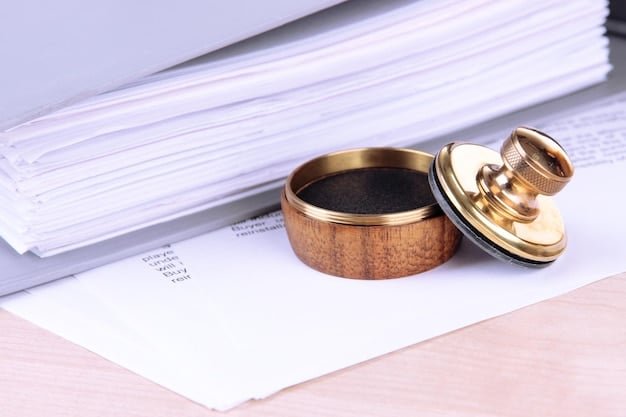Master the FDCPA: How to Use It to Your Advantage

The Fair Debt Collection Practices Act (FDCPA) offers significant protections against abusive debt collection practices; understanding your rights under this act is crucial for defending yourself against harassment and ensuring fair treatment.
Are you being harassed by debt collectors? The Fair Debt Collection Practices Act (FDCPA) is a federal law that protects you from abusive, unfair, and deceptive debt collection practices. Understanding your rights under the FDCPA can help you stop harassment, dispute debts, and even sue debt collectors who violate the law.
Understanding the Fair Debt Collection Practices Act (FDCPA)
The Fair Debt Collection Practices Act (FDCPA) is a federal law designed to protect consumers from unscrupulous debt collectors. It sets specific guidelines on how debt collectors can contact you, what they can say, and what actions they can take. Understanding these guidelines is the first step in using the FDCPA to your advantage.
This law ensures that debt collectors act fairly and ethically when trying to recover debts.
Who is Covered by the FDCPA?
The FDCPA applies specifically to debt collectors. It covers:
- Collection agencies
- Lawyers who regularly collect debts
- Companies that purchase delinquent debts and then try to collect them
What Types of Debts are Covered?
The FDCPA applies to personal, family, and household debts, including:
- Credit card debt
- Medical bills
- Auto loans
- Mortgages
Understanding who and what is covered is essential for knowing when the FDCPA applies to your situation.
In conclusion, understanding the scope of the FDCPA is essential for consumers. Knowing who is covered and what types of debts are protected allows individuals to recognize when the law applies to their specific circumstances, enabling them to assert their rights effectively.
Key Provisions of the FDCPA: Your Rights
The FDCPA outlines several key rights that protect consumers from abusive debt collection practices. Understanding these rights is paramount to defending yourself against unfair treatment and potential harassment. Knowing your rights empowers you to take action when collectors overstep.
These provisions provide clear guidelines for how debt collectors must behave.
Restrictions on Communication
Debt collectors are restricted in when and how they can contact you.
- They cannot call you before 8 a.m. or after 9 p.m.
- They cannot contact you at work if they know your employer prohibits it.
- They must cease communication if you notify them in writing that you refuse to pay the debt or want them to stop contacting you.
Prohibited Actions
The FDCPA prohibits debt collectors from engaging in abusive, unfair, or deceptive practices.
- Harassing or threatening you.
- Using obscene or profane language.
- Publishing a list of consumers who allegedly refuse to pay debts.
- Misrepresenting the amount of the debt or its legal status.
Right to Verify the Debt
You have the right to request verification of the debt.
- Debt collectors must provide you with certain information about the debt, including the name of the creditor and the amount owed.
- You have 30 days from the initial communication to request this verification.
- Until they provide verification, they must cease collection activities.
In summary, knowing your rights under the FDCPA empowers you to protect yourself from abusive debt collection practices. From controlling the timing and method of communication to demanding debt verification and preventing harassment, these provisions ensure fair and ethical treatment.

How to Stop Debt Collector Harassment Using the FDCPA
If you are experiencing harassment from debt collectors, the FDCPA provides several avenues for stopping it. Taking proactive steps can help regain control of the situation and protect your peace of mind. You have more power than you might think.
These strategies can help you effectively manage and end the harassment.
Send a Cease Communication Letter
One of the most powerful tools provided by the FDCPA is the ability to send a cease communication letter. This letter instructs the debt collector to stop contacting you. To do this:
- Write a letter stating that you refuse to pay the debt or that you wish them to stop contacting you.
- Send the letter via certified mail, return receipt requested, to have proof that the collector received it.
- Keep a copy of the letter and the return receipt for your records.
Dispute the Debt
If you believe the debt is not valid or the amount is incorrect, you can dispute the debt in writing.
- Send a letter to the debt collector within 30 days of their initial communication, stating that you dispute the debt and requesting verification.
- The debt collector must then provide you with evidence of the debt, such as a copy of the original contract or other documentation.
- While they are verifying the debt, they must cease collection activities.
Keep Detailed Records
Maintaining a record of all interactions with debt collectors is crucial.
- Note the date, time, and details of each call or communication.
- Keep copies of all letters and documents exchanged with the debt collector.
- These records can be invaluable if you need to take further action.
In conclusion, the FDCPA provides several practical strategies for stopping debt collector harassment. By sending a cease communication letter, disputing invalid debts, and meticulously documenting all interactions, consumers can effectively assert their rights and protect themselves from unfair and abusive practices.
Filing a Complaint: Holding Debt Collectors Accountable
If a debt collector violates the FDCPA, you have the right to file a complaint with regulatory agencies. This action can help hold them accountable and prevent them from engaging in similar behavior with others. Reporting violations is a crucial step in protecting consumers.
Submitting an official complaint can lead to investigations and penalties against the debt collector.
Federal Trade Commission (FTC)
The FTC is the primary federal agency responsible for enforcing the FDCPA. You can file a complaint with the FTC online or by phone.
Consumer Financial Protection Bureau (CFPB)
The CFPB also accepts complaints about debt collection practices. Filing a complaint with the CFPB can lead to further investigation and potential enforcement actions.
State Attorney General
Many state attorney general offices have consumer protection divisions that handle debt collection complaints. Check with your state’s attorney general to see if they have a process for filing a complaint.
When filing a complaint, be sure to include:
- The name and address of the debt collector.
- A detailed description of the violation.
- Copies of any relevant documents, such as collection letters or phone records.

In summary, if a debt collector violates the FDCPA, filing a complaint with the FTC, CFPB, or your state attorney general is an essential step in holding them accountable. By providing detailed information and relevant documentation, you contribute to enforcement efforts that protect consumers from abusive debt collection practices.
Suing a Debt Collector: When to Take Legal Action
In cases of severe or repeated FDCPA violations, you may have grounds to sue the debt collector. Taking legal action can provide compensation for damages and deter future misconduct. This is a serious step, but sometimes necessary.
Consulting with an attorney is crucial before proceeding.
Damages You Can Recover
If you successfully sue a debt collector for violating the FDCPA, you may be able to recover:
- Actual damages, such as emotional distress or financial loss.
- Statutory damages of up to $1,000, regardless of actual damages.
- Attorney’s fees and court costs.
Finding an Attorney
It is crucial to consult with an attorney experienced in FDCPA litigation. An attorney can assess the merits of your case, advise you on your legal options, and represent you in court.
Statute of Limitations
You must file your lawsuit within one year of the FDCPA violation. It is important to act promptly to preserve your legal rights.
In conclusion, suing a debt collector is a viable option when facing severe or repeated FDCPA violations. By understanding the potential damages, consulting with an experienced attorney, and adhering to the statute of limitations, you can pursue legal action to recover compensation and deter future misconduct.
Documenting Everything: Building Your Case
Thorough documentation is key to building a strong case under the FDCPA. Keeping records of all interactions with debt collectors can provide critical evidence of violations and strengthen your position. Detailed records are invaluable assets.
Without proper documentation, it can be challenging to prove your claims.
Phone Call Logs
Keep a record of every phone call you receive from debt collectors.
- Note the date and time of the call.
- Write down the name of the collector and the company they represent.
- Summarize the content of the conversation, including any threats or abusive language used.
Collection Letters and Notices
Save all letters, notices, and other written communication you receive from debt collectors.
- Pay attention to the details of the debt, including the amount owed, the name of the creditor, and any disclosures required by the FDCPA.
- Check for any inaccuracies or discrepancies in the information provided.
Financial Records
Gather any financial records that are relevant to the debt, such as credit card statements, loan agreements, or medical bills.
- These records can help you verify the amount of the debt and identify any errors or fraudulent charges.
In summary, meticulous documentation is essential for building a solid FDCPA case. By maintaining detailed phone call logs, preserving collection letters and notices, and gathering relevant financial records, you create a comprehensive record that can support your claims of FDCPA violations.
Seeking Advice: Resources for Debt Management
Navigating debt and dealing with debt collectors can be overwhelming. Fortunately, numerous resources are available to provide advice and support. Seeking professional help can make a significant difference in managing your debt effectively.
These resources can offer guidance and strategies for debt relief.
Credit Counseling Agencies
Nonprofit credit counseling agencies can provide free or low-cost advice on debt management, budgeting, and credit repair. Look for agencies that are accredited by the National Foundation for Credit Counseling (NFCC).
Legal Aid Societies
Legal aid societies offer free or low-cost legal services to individuals who cannot afford an attorney. They can provide assistance with FDCPA cases and other debt-related legal issues.
Government Agencies
The FTC and CFPB provide a wealth of information on debt collection practices and consumer rights. Their websites offer resources on managing debt and filing complaints.
| Key Point | Brief Description |
|---|---|
| 🛡️ FDCPA Rights | Protects against abusive collection tactics. |
| 🛑 Cease Contact | Send a letter to stop collector communication. |
| 📝 Debt Verification | Request proof of the debt’s validity. |
| ⚖️ File a Complaint | Report violations to FTC or CFPB. |
Frequently Asked Questions (FAQ)
▼
The FDCPA aims to protect consumers from abusive, unfair, and deceptive practices by debt collectors, ensuring they are treated ethically and within legal boundaries.
▼
No, debt collectors are restricted from calling before 8 a.m. or after 9 p.m., according to the FDCPA regulations, to prevent harassment.
▼
If a debt collector threatens you, document the incident and file a complaint with the FTC or CFPB, as such behavior violates the FDCPA.
▼
You typically have 30 days from the initial communication to dispute a debt in writing, requesting verification from the debt collector.
▼
Yes, if a debt collector violates the FDCPA, you have the option to sue them within one year of the violation, potentially recovering damages and attorney’s fees.
Conclusion
Understanding and utilizing the Fair Debt Collection Practices Act (FDCPA) is crucial for protecting yourself from abusive debt collection practices. By knowing your rights, documenting interactions, and taking appropriate action, you can ensure fair treatment and effectively manage your debt.





